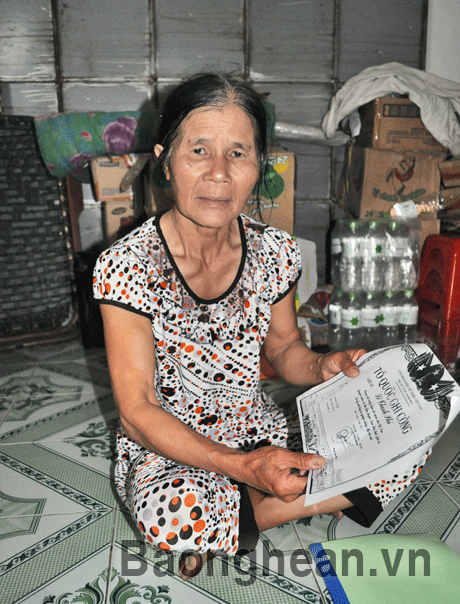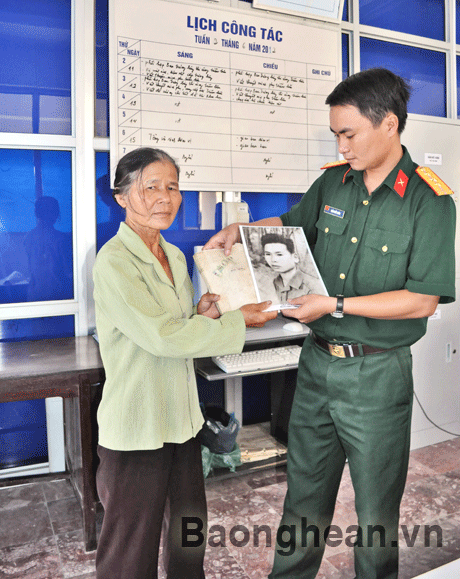Part I: Giving away war relics
(Baonghean.vn) - One afternoon in June, two women with shabby looks came to the Military Region 4 Museum. They gave...
(Baonghean.vn) -One afternoon in June, two women with shabby looks came to the Military Region 4 Museum. They handed the archivist a yellowed notebook. This was the notebook of martyr Le Thanh Phu, a platoon leader from Dai Dong-Kim Lien-Nam Dan, who died on the battlefield of the Southeast region on the morning of December 7, 1974.
In the touching story, we learned that one person's name is Le Thi Hoa, the younger sister of martyr Le Thanh Phu, and the other person is Le Thi Xuan, the daughter of the martyr's paternal uncle. The book was given to the Museum by the family, "because it contains the thoughts and feelings of a generation of young people who knew how to sacrifice for the Fatherland. Like Nguyen Van Thac, Dang Thuy Tram..., my sister recorded the journey she went through on the way to the battlefield. We want not only our family but also many people to know and understand more about those who have fallen like my sister" - Ms. Xuan confided.

Ms. Xuan tells about her memories of martyr Le Thanh Phu
The idea of donating the diary to the Museum came from Ms. Xuan, a cousin of martyr Phu, who has many memories of martyr Phu before he joined the army. Previously, the family did not have a memorial photo, so they often placed this diary on the altar. On April 30, Phu's old 12th class had a meeting, and old friends found a photo of him, enlarged it and gave it to the family. So the diary was put in a chest. Ms. Xuan, who is currently running a tea shop in Cua Ward
We went to Ms. Xuan's small house in a deep alley at the Book Publishing Collective (Cua Nam Ward - Vinh) to learn more about the story of martyr Phu.
Martyr Le Thanh Phu was born in 1950 in a poor family of 5 siblings. At the age of 15, Phu lost his father. Of the 5 siblings, Phu was the brightest. He studied well, had beautiful handwriting, and was good at poetry. “Once, Phu went plowing and broke his plow. So he wrote a poem about the broken plow and left it on the table. After his mother read the poem, she stopped scolding him,” said Ms. Xuan. “Back then, my family had a bicycle, which was always lent to Phu. Phu was a good student, very hard-working, and even taught me. The two of us often studied in my garden. When Phu joined the army, he often wrote letters home to his family, uncles, and siblings. Phu had an older brother who was 3 years older than him. In 1973, in his diary, Phu still wrote lines to his brother on the battlefield, not knowing that his brother had died the year before. He joined the army in 1967 and died in 1972, while Phu joined the army in 1969 and died in 1974. The death certificate stating that Phu died in 1972 is incorrect.”
The day Phu joined the army, he had just graduated from high school, and was waiting for the university entrance exam results when the general mobilization order came to the battlefield. He ran home from school, gathered his clothes and crossed the field to say goodbye to his mother. “Mom, I’m leaving!”. His mother held a bundle of rice seedlings and ran to the shore: “Where are you going, Phu?” - “I’m joining the army, Mom.” The mother only had time to hold her son’s hand, tears welling up in her eyes. “When Phu left, the villagers didn’t have time to hear the news, and there was no farewell party like everyone else.” Just two days after joining the army, he received his university admission notice. His mother held the notice and cried for a long time. However, everyone encouraged him: “Just keep the notice for him, when the reunification is over, he will come back, and he will take the notice and continue studying.”
After 3 months of training in Thanh Hoa, the ship carrying troops entered
5 years, through many battles, many battlefields, Mr. Phu took advantage of the breaks, the moments when the bombs stopped to write poems, diary entries. In his notebook, he recorded about the land he passed through, the battles and the belief in victory. There were lines sent to his mother, to his brother and siblings, to the girl he loved, to his old teacher, to the people who had taken care of him, and to a friend who had fallen…
He gave the notebook to a classmate, comrade, and fellow countryman on the rear, with the message: When I go to the front, if anything happens, keep this notebook and give it to my family.

Ms. Le Thi Xuan presented the Military Region Museum with 4 diaries and a photo of martyr Le Thanh Phu.
And he died. He died in an American bombing, his bones melted into the ground, and now he has no grave.
Peace and unity, his mother longed for him. With no death notice, she hoped that he was lost somewhere. The friend who kept the diary, in the next commune, knew about his sacrifice but did not dare to tell the truth, afraid that his mother would collapse. Then, two years after peace, after much anticipation and waiting from the family, the friend was brave enough to tell the truth to his family. The last lines of the diary were his unfinished story, and two notes written by two comrades, two friends on the battlefield after the day he sacrificed. Only then did he officially receive the death notice...
“When I returned my sister’s diary to the museum, I felt at peace. I felt like I had done something for her,” Ms. Xuan confided.
Thuy Vinh
